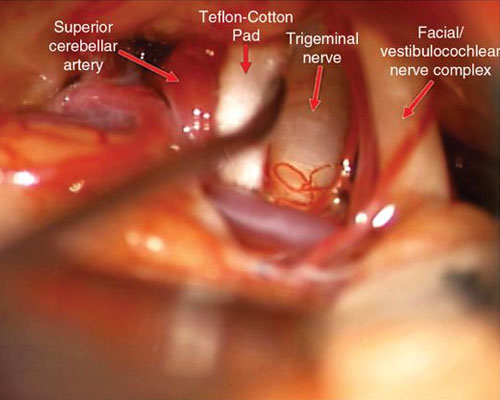Trigeminal Neuralgia Surgery - By Dr. Pravin Ganjre
The term Trigeminal Neuralgia (TN), has two words within it. The trigeminal nerve is one of the (twelve) cranial (head) nerves which has three divisions (ophthalmic, maxillary, and mandibular) supplying to the areas of the upper eye-lid to the lower chin. Neuralgia means pain. TN is a disorder of the Trigeminal nerve which presents as facial pain and headache. The pain is characteristically severe, intense, sharp, episodic, periodical, excruciating, stabbing, and short lasting
Trigeminal nerve is the largest of twelve cranial nerves. All sensations from the face and mouth are covered by the Trigeminal nerve. One of the branches of the Trigeminal is often injected by your dentist while working on your dental cavity.

Trigeminal Neuralgia: Introduction
The term Trigeminal Neuralgia (TN), has two words within it. The trigeminal nerve is one of the (twelve) cranial (head) nerves which has three divisions (ophthalmic, maxillary, and mandibular) supplying to the areas of upper eye-lid to the lower chin. Neuralgia means pain. TN is a disorder of the Trigeminal nerve which presents as facial pain and headache. The pain is characteristically severe, intense, sharp, episodic, periodical, excruciating, stabbing and short lasting.
The trigeminal nerve is the largest of twelve cranial nerves. All sensations from the face and mouth are covered by the Trigeminal nerve. One of the branches of the Trigeminal is often injected by your dentist while working on your dental cavity.
Trigeminal neuralgia (TN) is also called as tic douloureux. It is a chronic pain condition that causes extreme, episodic, sudden burning or shock-like pain on one of the side of face. Trigeminal neuralgia mostly occurs in people over age 50, but it can occur at any stage of age. It is more common in women. This disorder is not life-threatening. But the pain can be triggered by contact with the cheek (such as when shaving, washing the face, or applying makeup), brushing teeth, eating, drinking, talking, or being exposed to the wind.
The Trigeminal Neuralgia pain may appear suddenly, may last for a fraction of second or maybe for a few minutes. The pain is periodic in nature. In rare cases, it may last for a couple of hours, making the patients almost immobile, whereby he or she may not be able to do any other activity. One would tend to hold the affected part until the pain settles. Some patients may feel frustrated and may think of committing suicide out of hopelessness.
The pain might typically get worse by the following trigger:
- Brushing and gargling
- Kissing
- lightest wind or draft of air
- Chewing and drinking
- Movement of eyelids or blinking
- Touching the face
- Talking
Causes :
The exact cause of TN is not known. Recent research has shown that compressing the trigeminal nerve near its connection with the pons can injure the nerve’s protective myelin sheath and cause erratic and hyperactive functioning of the nerve. This leads to pain attacks at the slightest stimulation of any area served by the nerve. This type of injury may be caused by an aneurysm (an outpouching of a blood vessel) or by a tumour in the cerebellopontine angle. It is also seen in patients with Multiple Sclerosis.
Symptoms of Trigeminal Neuralgia (TN):
As Trigeminal Neuralgia is typically described by the patients as episodes of extremely severe pain. TN is probably the most painful condition known to the human race.
The Trigeminal Neuralgia pain is described as:
- Shooting pain
- Like electric shock (as if a live wire is left the free inside of the face
- Lancinating pain (as if poked by thorns)
- Stitching pain
- Stabbing pain
- Burning (as if fire)
- Excruciating pain (as if a drilling machine is put on the certain part of the face)
Treatment:
Treatment of trigeminal neuralgia includes medications and sometimes surgery.
Surgery is recommended, either to relieve the pressure on the nerve or to selectively damage it in such a way as to disrupt pain signals from reaching the brain.
